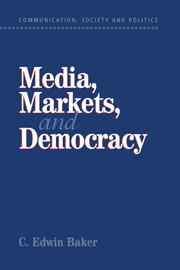Book contents
- Frontmatter
- Contents
- Preface
- PART I SERVING AUDIENCES
- 1 Not Toasters: The Special Nature of Media Products
- 2 Public Goods and Monopolistic Competition
- 3 The Problem of Externalities
- 4 The Market as a Measure of Preferences
- 5 Where To? Policy Responses
- PART II SERVING CITIZENS
- PART III AN ILLUSTRATION: INTERNATIONAL TRADE
- CONCLUSION
- Notes
- Index
4 - The Market as a Measure of Preferences
Published online by Cambridge University Press: 10 December 2009
- Frontmatter
- Contents
- Preface
- PART I SERVING AUDIENCES
- 1 Not Toasters: The Special Nature of Media Products
- 2 Public Goods and Monopolistic Competition
- 3 The Problem of Externalities
- 4 The Market as a Measure of Preferences
- 5 Where To? Policy Responses
- PART II SERVING CITIZENS
- PART III AN ILLUSTRATION: INTERNATIONAL TRADE
- CONCLUSION
- Notes
- Index
Summary
In a perfectly working marketplace, people engage in exchanges so as best to fulfill their existing preferences – as expressed by market exchanges and given their willingness and ability to pay. Market advocates assume that people's willingness and ability to pay within a market properly identify and measure consumer preferences. Only if this assumption is valid can unimpeded markets be expected to give people what they want; only then is the consumer really sovereign. This chapter critiques that assumption.
Significantly, people express preferences not only in the market and not only through market behavior. Indeed, people often express preferences simply by saying they prefer something, and what they will say they prefer often changes as the context changes. People also express preferences by choosing to spend time engaged in one activity rather than another. Indeed, the market is incapable of identifying a preference that requires avoidance of the market. That is, the market's willingness-and-ability-to-pay standard is merely one way to identify and measure preferences. What is identified and measured is an artifact of the method used, and other methods are possible. A system could refuse to credit any expression that does not survive discussion and reflection. Another system might measure preferences on the basis of how much a person would be willing to pay under circumstances in which everyone begins with equal wealth. Both these systems let the person be sovereign, counting only her expressions of preferences. Both offer a method of identifying and, at least in the second case, of measuring preferences, but both get results very different from the market's.
- Type
- Chapter
- Information
- Media, Markets, and Democracy , pp. 63 - 95Publisher: Cambridge University PressPrint publication year: 2001



